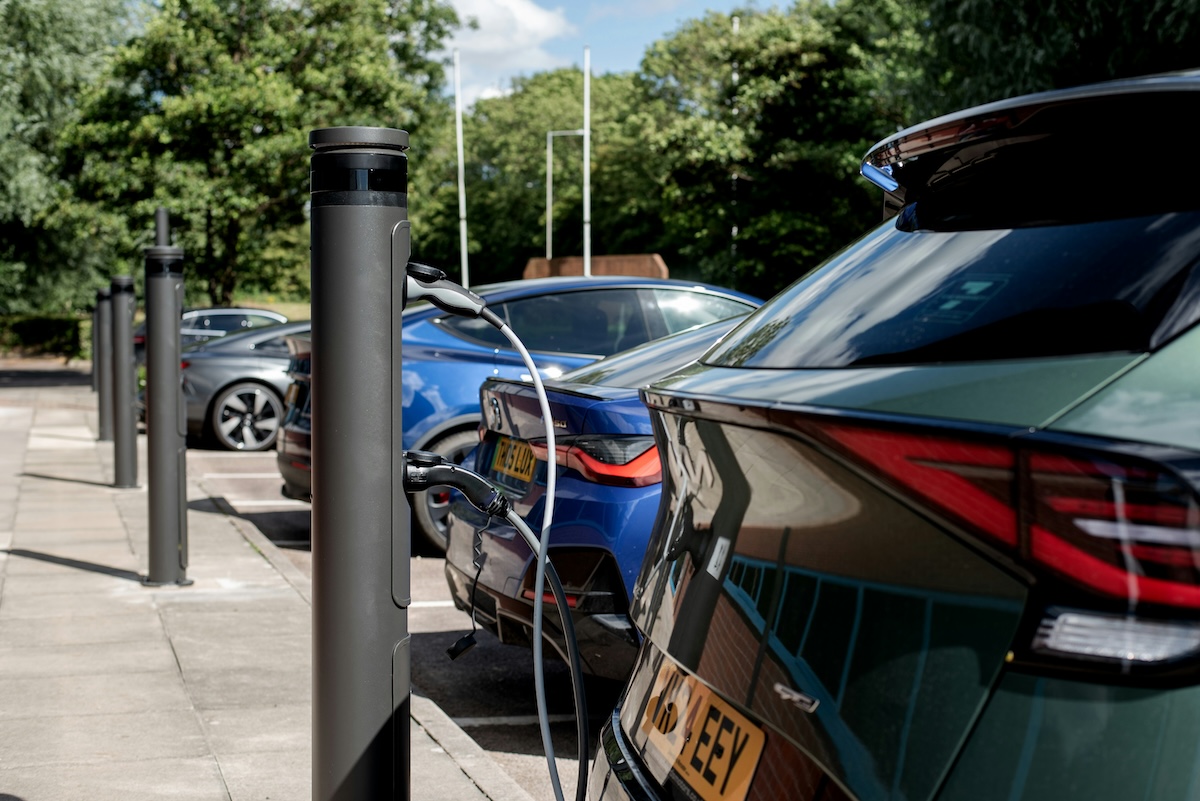Electric Vehicle Salary Sacrifice: All Your Questions Answered (With Examples)

When it comes to researching, understanding and implementing an electric vehicle salary sacrifice scheme, you may come across a few key issues:
- It’s hard to compare electric car salary sacrifice schemes because each one offers something different.
- Salary sacrifice schemes are still relatively new and are regularly updated, making it hard to know what does and doesn’t apply today.
- There is lots of information about electric car salary sacrifice, so it can be hard to understand what applies to you specifically: both as an employee or employer.
We’ve put together a guide to take you through everything you need to know about EV salary sacrifice. It gives a rundown on some of the terminology used, our most regular frequently asked questions (FAQs) and the key advantages of leasing an electric car with loveelectric’s salary sacrifice scheme.
Note: are you interested in implementing an electric car scheme for your company? With loveelectric, employers can offer the electric car salary sacrifice scheme as an employee benefit at zero cost to the company. Get set up now.
The key points:
- Getting an Electric Vehicle with salary sacrifice allows you to save up to 60% on the monthly lease cost of an electric car
- ‘Salary sacrifice’ means a small amount of pay is deducted from your gross salary each month
- The Benefit in Kind (BiK) rate for Electric Vehicles is incredibly low, remaining so until 2028
- Road tax - also known as Vehicle Excise Duty (VED) - won’t apply to EVs until April 2025.
- There are significant tax savings to be had with salary sacrifice
What is salary sacrifice?
In simple terms, salary sacrifice is the most affordable, efficient and financially accessible way of getting behind the wheel of an electric car. It allows employees to forgo some of their gross salary (i.e. pre-tax) to receive a benefit-in-kind. While ‘sacrificing’ your salary may sound daunting, the savings you receive far outweigh the modest reduction in your monthly salary.
You may already be familiar with other salary sacrifice schemes; such as the cycle-to-work initiative, pension contributions or childcare vouchers.
With loveelectric, we utilise salary sacrifice to make electric cars affordable. Find out more about salary sacrifice here.
How does salary sacrifice work for electric cars UK?
To offer up to 60% off the price of an EV to their employees, an employer typically signs up with an FCA regulated, third-party, salary sacrifice provider; like loveelectric.
Technically an employer can run the scheme themselves. However, this isn’t recommended. It’s a complex process, sitting at the intersection of employment law, tax regulations, financial services regulations and commercial law. For this reason, we strongly advise using a Financial Conduct Authority (FCA) regulated firm, which has development documentation that complies with all UK laws and HMRC regulations.
The employer is then evaluated by the leasing companies to assess its eligibility for the scheme. If eligible, the employer can then set up the salary sacrifice scheme for their employees. With loveelectric, implementing the scheme is completely cost-neutral to the employer - just beware of other providers charging a fee for this.
For an employee to be able to take out an electric car salary sacrifice lease, there are a few requirements:
- Must be a permanent employee
- Must have permanent UK residency
- Must be earning above minimum wage (after the salary sacrifice deduction has been made)
- Mustn’t have any at-fault claims or Category A convictions within the past 3 years
- Mustn’t have more than 6 points on their licence
Once the scheme is set up, employees can then pick any electric car they’d like. Availability and subsequent delivery of each EV depends on their respective lead time.
The monthly payments for the electric car lease will come out of the employee’s gross salary - i.e. before tax - which the employer arranges with their payroll provider or in-house finance team. This means employees simply receive a slightly reduced salary each month in exchange for their fully-insured, brand new, electric car. Since these payments are taken before tax, the employee’s Income Tax and National Insurance Contributions are lower.
Because the car is for personal use, any electric salary sacrifice lease is subject to Benefit-in-Kind (BiK) tax. However, the BiK tax rate for electric vehicles is incredibly low – currently only 2%, where it’s set to remain until April 2025. After that date, it will rise by 1% year-on-year until 2028.
In comparison, the BiK rate for traditional petrol/diesel (ICE) cars is as much as 37%.
The length of lease term on offer with the loveelectric’s salary sacrifice scheme, are 24, 36 and 48 months. We also have industry-leading Early Termination Protection. This offers maximum protection for both employees and employers, massively reducing the risk of a financial penalty in the case of an early termination.

If an employee leaves after 3 months of the lease commencing, they only have to pay a one time fee equivalent to 1 x month of the lease. The same fee applies to the employer if they make the employee redundant after 6 months. loveelectric also offers extensive cover for maternity and paternity leave - that’s up to 12 months genuinely rent free: no extension of the lease or double rates once they return, just complete peace-of-mind for new parents. Read more about our early termination policy here.
Can I use a salary sacrifice scheme to get an Electric Vehicle?
Absolutely. With the help of a salary sacrifice scheme, employees can lease an EV and save a significant amount on the monthly cost - up to 60%. This dramatic saving is achieved through reductions in National Insurance and Income Tax payments.
At loveelectric, we offer all-inclusive car leasing plans to ensure worry-free motoring. Included in the monthly lease price: insurance, servicing, maintenance, tyre replacement and breakdown cover.
Employers simply sign up to the service (it doesn’t cost them a penny) which then gives employees access to the drastically reduced salary sacrifice prices for every EV on the market. Not only is this a great benefit for company and employee alike, but it helps keep the UK’s air clean and contributes towards our collective goal to net zero.
Once a company signs up to loveelectric, their employees get access to the exclusive app. Here they can generate bespoke quotes for any electric car available in the UK, choose the spec/trim and get it delivered to their door.
When the order is approved and signed off by the employer, the monthly cost of the electric car will be deducted from the employees monthly gross salary (gross salary = salary before tax has been applied). This is their ‘salary sacrifice’.
.avif)
Can I get a Tesla through salary sacrifice?
Yes. Which one would you like? A Tesla Model 3 lease? A Tesla Model Y lease? loveelectric has a diverse selection of EVs to choose from, including all of the different Tesla Models.
Read our Ultimate Tesla Leasing Guide if you’re not sure which one to go for. If you’ve made your mind up, then see how much you could save on a Tesla Model Y lease here.
Can I buy a car with salary sacrifice?
Typically, no. It’s very rare for salary sacrifice schemes to let you buy the electric car once the lease period is over. But what are the benefits to leasing over buying outright?
Firstly, it eliminates the initial, up-front, cash outlay. Leasing with loveelectric requires no deposit. With salary sacrifice, we make expensive electric cars affordable and put you in the driver’s seat.
Secondly, depreciation. If you lease, it isn’t your problem.
All cars depreciate in value, but electric cars carry an extra risk. Due to the rapid progression in battery technology, there is a risk that EVs will depreciate significantly faster over a 36 or 48 month period, as more advanced models enter the market. It’s far more prudent to let the leasing company take on the risk to the car’s residual value than taking it on yourself.
Additionally, it’s difficult to budget for a "balloon payment", as the exact amount payable often isn’t revealed until a few months before the lease is due to expire. Or would you rather lease: simply return the vehicle once the agreement has ended and get a brand new electric vehicle in its place.
With loveelectric, we keep it simple and don’t offer the option of buying the car. You hand the car back and can then choose from hundreds of other cars to replace it, we’ll even deliver it straight to your door.
Do you pay tax on a salary sacrifice car?
No, employees don’t have to pay tax on the salary sacrifice amount that’s used to pay for the monthly lease. The monthly lease cost is taken from their gross salary (i.e. before tax).
With salary sacrifice, employees reduce their taxable income and subsequently pay less Income Tax and National Insurance. If you’re unfamiliar with salary sacrifice, ‘sacrificing’ your salary may sound like a bad thing at first - as if you’re losing income. This isn’t the case. By paying for your electric car with loveelectric, you’re actually saving a huge amount of money on the monthly lease cost.
With salary sacrifice, a small portion of that monthly salary is taken straight from their income pre-tax and pays for the electric car.
For example: an employee’s net monthly pay is currently £1850/month. If they took out a £350/month electric car lease with loveelectric, their take-home pay would reduce to £1,500/month. If they were to take out a traditional lease with a competitor, the monthly lease cost of the vehicle is taken from your net salary (i.e. after-tax), leaving you far less of your take-home pay.
Triple Saving: a Tax Breakdown
One of the key elements which makes loveelectric able to offer such affordable prices is the triple saving; loveelectric customers will save on VAT, income tax and national insurance contributions.
One of the key elements which makes loveelectric able to offer such affordable prices is the triple saving; drivers save on VAT, Income Tax and National Insurance Contributions.
1. Value-Added Tax (VAT)
VAT is a consumer tax which is applied to almost all consumer goods and services, which currently stands at 20%. If you were purchasing outright or leasing an electric vehicle in the traditional structure, you would be required to pay VAT on the vehicle. However, under salary sacrifice, the employer is technically responsible for the lease so pays the VAT. But it doesn’t leave the employer out of pocket. They can reclaim 10% of the VAT back from the government and make up the remaining balance by reducing their national insurance payments.
2. Income tax
You’re probably familiar with Income Tax, but as a brief reminder: it’s the tax you pay on your income. The amount of income tax required is based on how much you earn. We’ve produced an extensive guide to Tax Bracket Savings in relation to Electric Car Salary Sacrifice, but the amount payable also depends on where you live in the UK. Scotland, for example, has slightly different rules to the rest of the UK.
With salary sacrifice, you forgo a portion of your income in exchange for the electric car lease payments. In turn, this decreases your income tax.
3. National Insurance (NI)
National Insurance is a form of tax used to pay for different kinds of benefits; including health, social care and pensions. Similarly to income tax, NI is based on how much you earn; both employees and employers have to pay NI. If you’d like to learn more about how NI works, we recommend looking at the HMRC website.
Salary sacrifice is cost-effective for both employers and employees alike. By utilising a salary sacrifice scheme, both save on national insurance contributions (NIC) - the more an employee earns, the more NIC they must pay, so forgoing a proportion of their salary actually can result in an overall saving.
The employer reduces its NIC contributions too. The more employees that take out a lease, the smaller the employer’s NIC bill. It’s a win-win all round.
What is Benefit in Kind (BIK) tax?
It’s all too good to be true. What’s the catch? There really isn’t one. The magic comes from the low Benefit-in-Kind (BiK) rate afforded to EVs. BiK is a form of tax an employee has to pay for receiving a perk/benefit related to their employment that can be used outside of business hours and is in place of monetary compensation.
All vehicles - including electric cars - have a certain BiK rate payable to HMRC. The tax rate is determined by taking the car’s list price (otherwise known as its P11D value) and applying a percentage dependent on its emissions. Historically, the higher the CO2 emissions were, the higher the BiK rate.

Of course, EVs have zero tailpipe emissions - meaning no CO2 output. Their popularity however, has forced HMRC to adapt its BiK stance on electric cars. It’s still an incredibly low rate - currently at 2% until 2025 - which contributes towards the huge savings achieved with salary sacrifice.
Can I get an EV with salary sacrifice if I’m paid an hourly wage (PAYE)?
Yes. It just depends how much you earn. Your take home pay (i.e. the amount left over after you’ve paid for the monthly) must remain above minimum wage. We have a huge range of electric vehicles, suiting all different budgets, so it’s likely we’ll be able to accommodate.
Do EVs have to pay road tax (VED)?
Currently, Electric Vehicles are exempt from paying road tax (or Vehicle Excise Duty). However, from April 2025 onwards, any zero tailpipe emissions vehicle registered after 1st April 2017 will qualify for the lowest first year rate - £10/year.
After the first year of registration, electric cars will then have to pay the standard rate of road tax - which is currently undefined for April 2025 onwards.
What is a salary sacrifice car scheme example?
Warren lives in England and is looking to get a Honda E with a salary of £26,000 per year. Warren’s gross salary is £2,166.67. He’d like a lease term of 48 months and anticipates the mileage to be around 5,000 miles every year.
Below are two options of leasing an electric car*, one using loveelectric’s salary sacrifice scheme and one using a standard lease agreement.
*(prices indicative to outline the comparison in savings, may not reflect the actual lease cost)
• Standard Lease Agreement:
Prior to even thinking about the car that he wants to lease, Warren’s monthly income would be subject to tax. Based on his salary, he would have to pay £223.83 every month in income tax, as well as £164.32 in national insurance.
Warren’s take home pay each month (i.e. his monthly net salary) is £1778.52.
If the average lease price (including VAT) for a Honda E is £427 per month, Warren would pay this amount using his net salary of £1778.52.
£1778.52 - £427 = £1351.52
£1351.52 is the amount Warren would be left with after paying for the lease with his gross (take home) pay. Keep in mind, this doesn’t include the cost of insurance or brokerage fees.
• Lease Agreement With loveelectric:
Using the same lease figures, if Warren instead went to loveelectric to get his Honda E, he would take his gross monthly salary of £2166.67 and make a gross sacrifice of £356 every month (this is £427 minus the VAT).
This means that his monthly gross pay would change from £2166.67 to £1810.67 every month.
£2166.67 - £356 = £1810.67
Following this, Warren would then be taxed on this income, £152 in national insurance and £122 income tax, meaning that his net income would be £1537.
£1810.67- (£122 + £152) = £1537
The result is a monthly saving of £185 over traditional leasing. Salary sacrifice leases also include maintenance, fully comprehensive insurance, servicing, breakdown cover and tyre replacement.
You can read and find more examples here: Salary Sacrifice Electric Car Examples: How It Works In Practice
Does owning an electric car save you money?
Compared to a petrol or diesel counterpart, yes.
If you want to see how much you could save on a brand new electric car, try the Find My eCar section on our website. Here you can search any EV on the market: input your annual mileage, contract length and salary to get a monthly quote on any model listed.
To maximise your savings, utilise a smart home charger and charge back up for a fraction of what it’d cost on the open road. We’ve partnered with some spectacular companies to get you up to 50% off a fully installed smart home charger.
If you’re an employer looking to increase your company’s benefits and create an enviable workplace - get in touch. Increase staff retention, attract the best talent and show your customers you’re committed to reducing carbon output. Click here to learn more and get started.


.avif)

